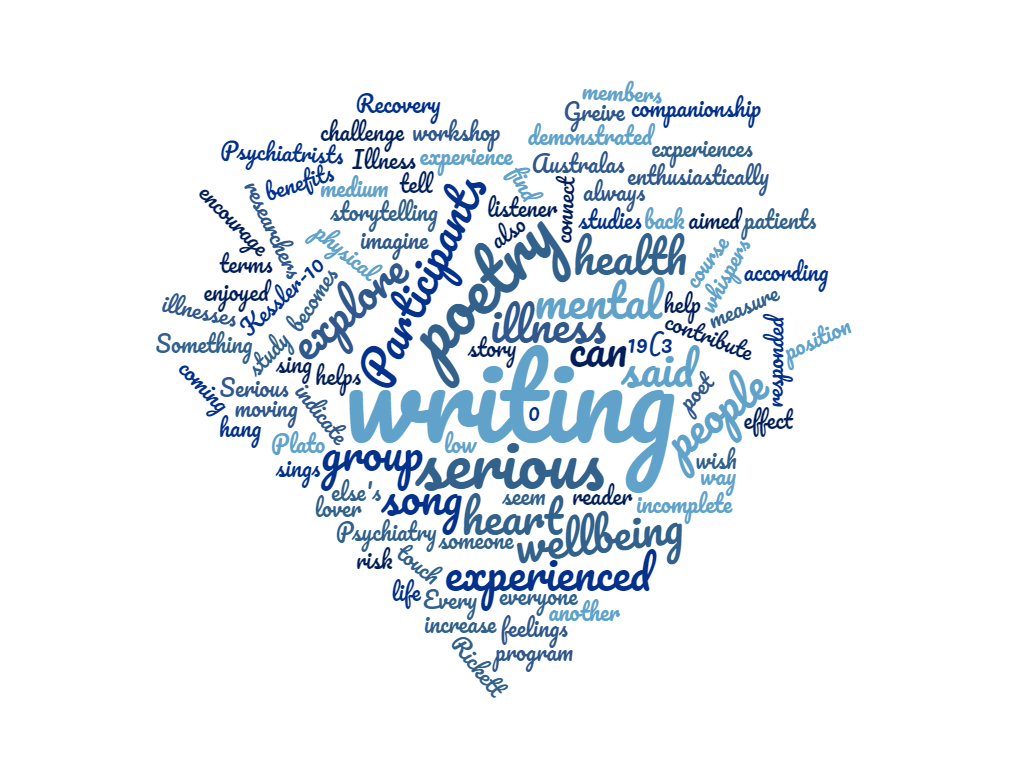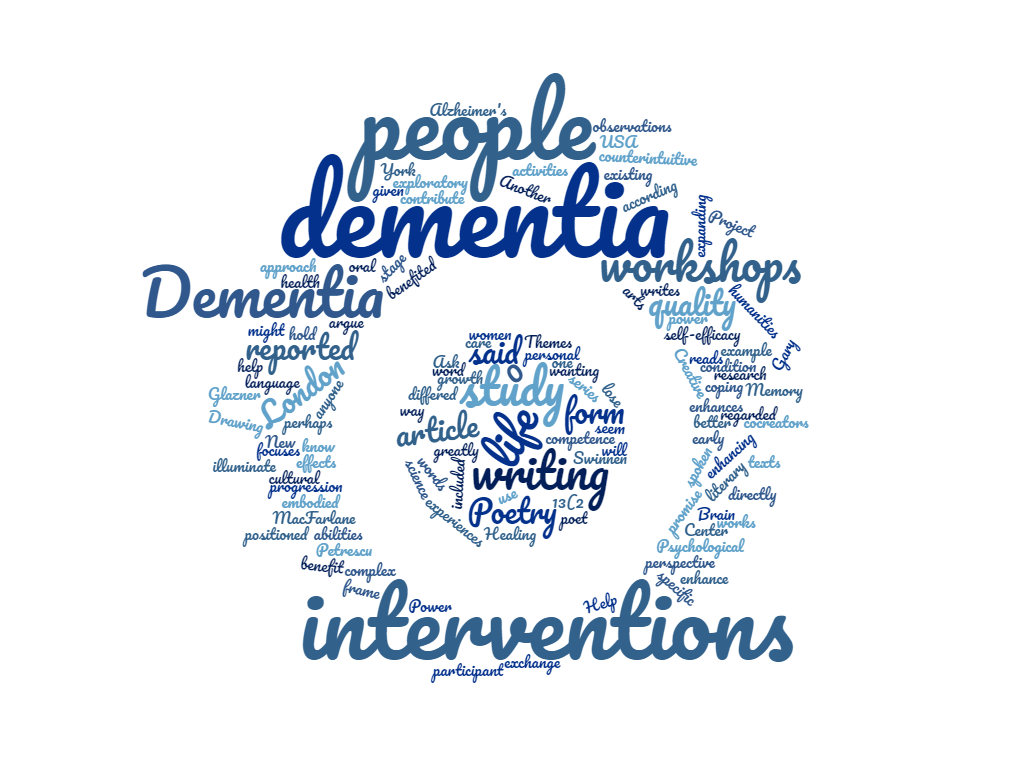|
Not everyone aspires to be a poet. Not everyone enjoys reading poetry but perhaps we should rethink the role of poetry in individual healing and brain health. Start at the beginning with the feeling—what is that feeling—that creates a stirring poem. “A poem begins as a lump in the throat, a sense of wrong, a homesickness, a lovesickness," said Robert Frost. Poems are also for finding those things that will shift the sickness and the despair into hope, inner peace, and a sense of freedom. The Peace of Wild Things by Wendell Berry "When despair for the world grows in me and I wake in the night at the least sound in fear of what my life and my children’s lives may be, I go and lie down where the wood drake rests in his beauty on the water, and the great heron feeds. I come into the peace of wild things who do not tax their lives with forethought of grief. I come into the presence of still water. And I feel above me the day-blind stars waiting with their light. For a time I rest in the grace of the world, and am free.” Poetry, Storytelling, and Blood Pressure Telling your story in prose or poetry is helpful in letting go of stress and to decrease blood pressure symptoms. This study showed that "storytelling is emerging as a powerful tool for health promotion in vulnerable populations. The storytelling intervention produced substantial and significant improvements in blood pressure for patients with baseline uncontrolled hypertension," according to Houston, T. K., J. J. Allison, et al. (2011). "Culturally appropriate storytelling to improve blood pressure: a randomized trial." Ann Intern Med 154(2): 77-84. Who do you tell your story to? Whose stories do you hear? Try writing a short story or poem about an experience you have had. “...and then, I have nature and art and poetry, and if that is not enough, what is enough?” Vincent van Gogh Recovery From Serious Illness
In a study that aimed to explore the effect of a poetry writing program for people who had experienced a serious mental illness researchers said, "Participants responded enthusiastically and each group demonstrated an increase in wellbeing over the course of their workshop, moving them from medium to low risk on the Kessler-10, a measure of wellbeing. Participants enjoyed the challenge of writing and the companionship of other group members. Psychiatrists are in a position to encourage patients who have experienced a serious illness to explore writing as a way of coming to terms with their experiences," according to Rickett, C., C. Greive, et al. (2011). "Something to hang my life on: the health benefits of writing poetry for people with serious illnesses." Australas Psychiatry 19(3): 265-268. These studies seem to indicate that poetry writing and storytelling can contribute to physical and mental health. It can also help us connect to the reader or listener of our story and helps us imagine someone else's feelings during an experience they tell us. “Every heart sings a song, incomplete, until another heart whispers back. Those who wish to sing always find a song. At the touch of a lover, everyone becomes a poet,” said Plato. Dementia and Brain Power Help An article in "Dementia" reported, "This article focuses on poetry interventions as one example of cultural arts interventions. The use of poetry might seem counterintuitive, given that people with dementia lose their language abilities and that poetry is regarded to be the most complex literary form. I argue that expanding on existing research on poetry interventions from a health and science perspective with a humanities approach will help illuminate how poetry works to enhance the exchange with people with dementia. Drawing on participant observations of poetry interventions by Gary Glazner (Alzheimer's Poetry Project, USA) at the New York Memory Center, I frame poetry interventions as a specific form of oral poetry in which people with dementia are positioned as cocreators of embodied texts and directly benefit from the power of the spoken word," said Swinnen, A. M. (2014). "Healing words: A study of poetry interventions in dementia care." Dementia (London). Another study reported on a series of poetry writing workshops, "All of the women said that they benefited from the workshops, but their experiences differed greatly. Themes included competence and self-efficacy, personal growth, wanting to contribute and poetry writing as a way of coping with the progression of the condition. Creative activities such as writing poetry hold promise for enhancing the quality of life of people with dementia," according to Petrescu, I., K. MacFarlane, et al. (2014). "Psychological effects of poetry workshops with people with early stage dementia: an exploratory study." Dementia (London) 13(2): 207-215. Poetry enhances the quality of life of people with dementia and perhaps anyone who writes or reads poetry. Do you know a poet? Ask them how their life is better because of poetry.
0 Comments
"The quality of the food we eat is so important to our wellbeing. There are 18 million Americans with diabetes, some due to genetics and some due to the quality of the food they are consuming. What we eat not only affects our physical bodies but also affects our ability to think, reason, relate, create, and manage stress. The food we eat directly affects our brain’s function. Poor input equals poor output. I have experienced this myself again and again. It is more fun, easier, and less expensive to make the easy choices of pre-packed foods versus grabbing whole organic food. There is no problem grabbing one’s favorite comfort food now and again. But I have noticed personally that when processed foods become the majority of my diet that my mind slows and sadly my emotions are less stable. "
Read the Complete Article on Achieve Success Without Stress, Melissa Heisler Stress Reduction Expert |
Kimberly Burnham, PhD (Integrative Medicine)
860-221-8510 phone and what's app. Skype: Kimberly Burnham (Spokane, Washington) NerveWhisperer@gmail.com 4 Month Brain Health Coaching Package $600 includes: 8 one hour session (twice a month) plus ... Details Here
Regular Rate $120 per hour
Free 20-30 minute consultations available.. Call 860-221-8510 PST or email NerveWhisperer@gmail.com for an appointment this week.
Archives
January 2018
Categories
All
|




